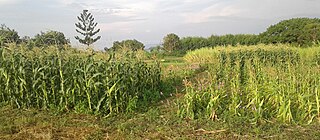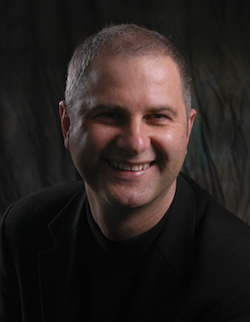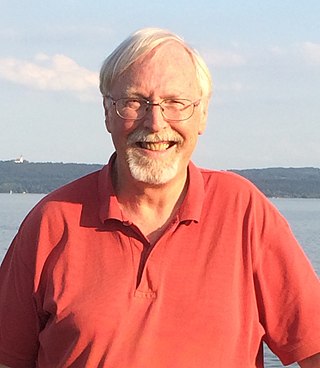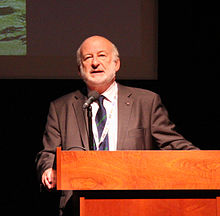
Rothamsted Research, previously known as the Rothamsted Experimental Station and then the Institute of Arable Crops Research, is one of the oldest agricultural research institutions in the world, having been founded in 1843. It is located at Harpenden in the English county of Hertfordshire and is a registered charity under English law.
Chemical ecology is the study of chemically mediated interactions between living organisms, and the effects of those interactions on the demography, behavior and ultimately evolution of the organisms involved. It is thus a vast and highly interdisciplinary field. Chemical ecologists seek to identify the specific molecules that function as signals mediating community or ecosystem processes and to understand the evolution of these signals. The substances that serve in such roles are typically small, readily-diffusible organic molecules, but can also include larger molecules and small peptides.
A semiochemical, from the Greek σημεῖον (semeion), meaning "signal", is a chemical substance or mixture released by an organism that affects the behaviors of other individuals. Semiochemical communication can be divided into two broad classes: communication between individuals of the same species (intraspecific) or communication between different species (interspecific).
The Albert Medal of the Royal Society of Arts (RSA) was instituted in 1864 as a memorial to Prince Albert, who had been President of the Society for 18 years. It was first awarded in 1864 for "distinguished merit in promoting Arts, Manufactures and Commerce". In presenting the Medal, the Society now looks to acknowledge individuals, organizations and groups that lead progress and create positive change within contemporary society in areas that are linked closely to the Society's broad agenda.

Push–pull technology is an intercropping strategy for controlling agricultural pests by using repellent "push" plants and trap "pull" plants. For example, cereal crops like maize or sorghum are often infested by stem borers. Grasses planted around the perimeter of the crop attract and trap the pests, whereas other plants, like Desmodium, planted between the rows of maize, repel the pests and control the parasitic plant Striga. Push–pull technology was developed at the International Centre of Insect Physiology and Ecology (ICIPE) in Kenya in collaboration with Rothamsted Research, UK. and national partners. This technology has been taught to smallholder farmers through collaborations with universities, NGOs and national research organizations.
David John Finney, was a British statistician and Professor Emeritus of Statistics at the University of Edinburgh. He was Director of the Agricultural Research Council's Unit of Statistics from 1954 to 1984 and a former President of the Royal Statistical Society and of the Biometric Society. He was a pioneer in the development of systematic monitoring of drugs for detection of adverse reactions. He turned 100 in January 2017 and died on 12 November 2018 at the age of 101 following a short illness.
George William Cooke CBE FRS was a British chemist. He was the deputy director of Rothamsted Experimental Station from 1962 until 1975, and Chief Scientific Officer of the Agricultural Research Council from 1975 until his retirement in 1981.

Agenor Mafra-Neto is a chemical ecology researcher and entrepreneur in the entomological field of insect chemical ecology. He is the CEO of ISCA Technologies, a company specializing in the development semiochemical solutions for pest management, robotic smart traps and nanosensors. Dr Mafra-Neto is the CEO and Director of Research and Development at ISCA Technologies, Inc. which he founded in 1996 in Riverside, California. ISCA Tecnologias, Ltda was founded in Brazil in 1997.

Dame Lesley Anne Glover is a Scottish biologist and academic. She was Professor of molecular biology and cell biology at the University of Aberdeen before being named Vice Principal for External Affairs and Dean for Europe. She served as Chief Scientific Adviser to the President of the European Commission from 2012 to 2014. In 2018 she joined the Principal's senior advisory team at the University of Strathclyde.
Graham John Hutchings CBE FRS FIChemE FRSC FLSW is a British chemist, Professor for Research at Cardiff University.

Bill S. Hansson is a Swedish neuroethologist. From June 2014 until June 2020, he was vice president of the Max Planck Society.
David G. Heckel is an American entomologist.
Zeyaur R. Khan is a professor and the principal scientist at International Centre of Insect Physiology and Ecology (icipe). He has dedicated his 30-year career as an international agricultural scientist to advancing the science and practice of agriculture by studying and applying chemical ecology, behavior, plant-plant and insect-plant interactions to improve farm productivity to combat poverty and food insecurity in Africa. He is responsible for the discovery and wide scale implementation of a pro-poor scientific innovation for enhancing food security and environmental sustainability in Africa]. This was achieved through the biologically-based IPM technology called "Push-Pull", developed for small-holder cereal-livestock African farmers. Prof. Khan’s work is an example demonstrating that creativity and innovation in science can provide practical solutions for the real problems of thousands of small-holder poor farmers and promote their food security and sustainable livelihoods.

Hugh David Loxdale is an entomologist. He was professor of ecology at the Institute of Ecology, University of Jena from 2009 to 2010, president of the Royal Entomological Society from 2004 to 2006, and honorary visiting professor at the School of Biosciences, Cardiff University. Loxdale works on the population biology, ecology, and genetics of insects, especially aphids and their wasp parasitoids.
Lionel Roy Taylor was a British ecologist, president of the British Ecological Society 1984/85, and editor of the Journal of Animal Ecology.

James Henderson Naismith is Professor of Structural Biology at the University of Oxford, former Director of the Research Complex at Harwell and Director of the Rosalind Franklin Institute. He previously served as Bishop Wardlaw Professor of Chemical Biology at the University of St Andrews. He was a member of Council of the Royal Society (2021-2022). He is currently the Vice-Chair of Council of the European X-ray Free Electron Laser and Vice-President (non-clinical) of The Academy of Medical Sciences. It has been announced that he will be the Head of the MPLS division at Oxford in the autumn of 2023.

Jnanendra Nath Mukherjee CBE, FRSC was an Indian colloid chemist.

Walter Soares Leal is a Brazilian biochemist and entomologist who is known for identifying pheromones and mosquito attractants, and elucidating a mechanism of action of the insect repellent DEET.
Linda M. Field FRES FRSB is a British scientist noted for her work on the insecticide mode of action and resistance.
Baldwyn Torto is a Ghanaian scientist. He is a Chemical ecologist, and a Principal Scientist at the International Centre of Insect Physiology and Ecology (ICIPE). He also doubles as an extraordinary professor and the head of Behavioural and Chemical Ecology Unit, Department of Zoology and Entomology at the University of Pretoria, South Africa. He is a fellow of the Entomological Society of America, a fellow of the African Academy of Sciences, and a member of the American Chemical Society.









